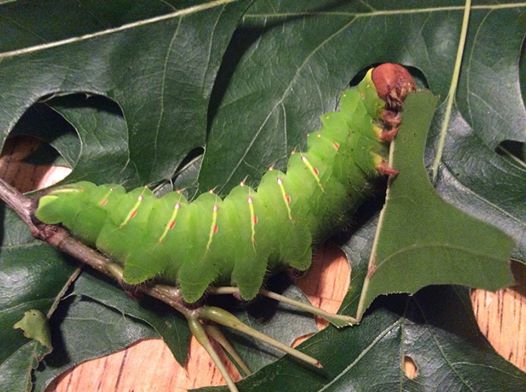“They enrich our journey and make every day more interesting.”
That’s how Dr. David L. Wagner, Professor of Ecology and Evolutionary Biology at the University of Connecticutt, began his talk Monday evening at the Austin Butterfly Forum. His audience of about 70 wouldn’t disagree after watching his entertaining and educational presentation.

The author of Caterpillars of Eastern North America itemized the many reasons we should care about caterpillars (or butterflies-to-be, as I like to call them).
Apart from their aesthetic contribution of morphing into the lilting butterflies we know and love, caterpillars are the “fabric that tethers the terrestrial communities” that keeps our forests and wildscapes whole, says Dr. Wagner. They’re also “the hamburger of the animal world.”
Grizzly bears in Yellowstone Park have been observed consuming 20,-30,000 moths per day and a robin was documented eating 165 caterpillars in a single 24 hour stretch–more than twice its bodymass. And the bats that emerge from Austin’s Congress Avenue bridge? Each evening between March and November, the flying mammals consume 10,-20,000 insects, “mostly moths,” says Dr. Wagner. Where would all these creatures be without caterpillars?
Birdwatchers are well aware of the consequence of caterpillars. They are the preferred grub of many songbirds. Dr. Wagner pointed out that caterpillar enthusiasts often begin as birders since watching birds leads one to track their food source: caterpillars.
Caterpillars are also pollinators and responsible for the silk shirts and sheets we enjoy (thank you, silk moth!). Some species are the janitors of the wild, eating and cleaning up dead leaf matter. One of the lesser known imports of caterpillars is how they play a big-but-indirect role in our daily lives by exerting a “chronic force” on plants to evolve defense mechanisms to discourage being consumed by them.
[wpvideo pceiEIg0]
“Plants are immobile. Caterpillars are omnipresent,” says Dr. Wagner. Plants have adapted to that by evolving strong, often distasteful flavors like caffeine, latex and capsaicin to deter their consumption.
Coffee, tea, latex, aspirin, the tannins in red wine, cinnamon, pepper, and many other spices all result from plants’ reaction to caterpillars. “In a roundabout way, life would be considerably less rich and less interesting (and much less flavorful) without caterpillars,” said Dr. Wagner.
Dr. Wagner showed dozens of amazing and entertaining slides of caterpillars in various contortions and camouflage–posing as sticks, pretending to be flower buds–but the biggest laugh came when he described a peculiar habit of a cute yellow-and-brown caterpillar that morphs into a lovely brown butterfly.
The silver spotted skipper, not uncommon in Austin and San Antonio, apparently practices the habit of “ballistic defecation”–shooting its excrement up to 153 centimeters from its body. The trick throws off predators by spreading its scent far and wide.
Sunday morning a handful of Austin Butterfly Forum members were treated to an entertaining walk in the woods at the Barton Creek Greenbelt in Austin. Grabbing our “beating sheet” we tackled the dry riverbed, discovering myriad insects, but not a huge haul of caterpillars, thanks to the drought. For a proper demo of bush- beating technique, see the video, above.
Dr. Wagner recommends carrying a magnifying glass or lens to better observe the fascinating creatures. “Caterpillars are little mysteries. Much of the time you are not sure how they will turn out,” he says.
Which surely contributes to their charm.


Your writing and the content are always an uplifting voyage. Thanks for bringing the natural world into focus and my awareness.
Thanks, Lisa!
[…] As a passionate butterfly enthusiast, I often turn to Mike for a scientific perspective which he always generously provides. Mike also serves as president of the Austin Butterfly Forum where he helps recruit first-class speakers such as world-renown caterpillar expert Dr. David Wagner who then avail themselves to Austin audiences with understanding, knowledge and really fun field trips. […]
[…] As a passionate butterfly enthusiast, I often turn to Mike for a scientific perspective which he always generously provides. Mike also serves as president of the Austin Butterfly Forum where he helps recruit first-class speakers such as world-renown caterpillar expert Dr. David Wagner who then avail themselves to Austin audiences with understanding, knowledge and really fun field trips. […]